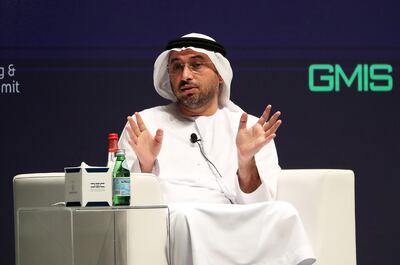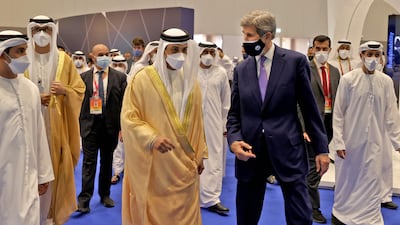The UAE called for a united front to advance the manufacturing and industry sectors by harnessing new-age technologies and boosting cross-border collaboration, as the world enters the post-Covid-19 age and in anticipation of any unprecedented crises.
Global manufacturing, which was severely affected by the pandemic, has witnessed a considerable rebound, but its uneven recovery is creating supply chain bottlenecks and backlogs. If not carefully addressed, this dynamic could potentially slow future growth, Dr Sultan Al Jaber, Minister of Industry and Advanced Technology, said at the opening ceremony of the fourth Global Manufacturing and Industrialisation Summit in Dubai on Monday.
“For industry leaders, the lessons of the post-pandemic recovery are very visible and, in fact, very clear: real recovery requires resilience and agility. We need to reinforce industrial capacity, strengthen supply chains and control and reduce costs,” Dr Al Jaber said.
He also encouraged businesses to operate more flexible models and strengthen their balance sheets “with a mix of cash reserves and sensible debt financing”, as well as building private-public partnerships to collectively manage risks to deal better with future disruptions.
The manufacturing sector is a key pillar of the UAE economy and the government has taken several steps to attract investment and promote inclusion.
Last month, the UAE announced the Industry 4.0 programme, which aims to increase productivity and the development of innovative products, in turn boosting manufacturing by 30 per cent and adding Dh25 billion ($6.8bn) to the country's economy by 2031.

Local companies are ramping up efforts to contribute to this drive. Abu Dhabi's Mubadala is actively involved in boosting key sectors including renewable energy, steel and space. The Capital's Tawazun Economic Council and Al Yah Satellite Communications Company agreed to set up a joint venture to develop and manufacture satellite communications technology in the UAE.
These initiatives will all contribute to the diversification of the UAE economy and help it march towards an innovation-driven future.
“As the UAE celebrates its 50th anniversary, our leadership has issued a blueprint for prosperity for the next 50 years. And it is our guide to building a dynamic, world-leading economy. And at the core of that blueprint is partnership,” Dr Al Jaber said.
UAE Minister of Industry and Advanced Technology
“No economy exists in a vacuum and we know that progress is faster – much faster – when people work together. And in that spirit, I invite all of you to partner with the UAE; together, we can reinforce our collective resilience and agility, and we can all succeed and help bring prosperity through prosperity in the world.”
Data is the “most important tool” for companies and digitisation is something they need to leverage in order to speed up decision-making processes and be prepared for unexpected disruptions, according to Shadi Malak, chief executive of Etihad Rail.
“Companies need to be better and more efficient in utilising these platforms, and be able to shift more towards collecting data rather than leaving it to third-party suppliers. This will enhance your service and enable you to deliver to your end-customer,” he said.

The workforce will also play an integral part in the sector and getting the right talent is the most difficult part of building an ecosystem, said Omar Al Olama, Minister of State for Artificial Intelligence, Digital Economy and Remote Working System.
“There are certain things money cannot buy. You can put the infrastructure and invest in it, but getting people to use and build something meaningful out of it is actually the hardest thing to do. What lets people leverage the infrastructure to build something meaningful is the quality of talent,” he told the audience.
Last week, the Abu Dhabi Department of Economic Development expanded its freelance professional licence programme, adding 11 more commercial activities to the list as it seeks to boost the emirate's business environment and create more technical jobs to attract and retain talent.
Attractive packages will also be a lure, with a recent report from Mercer showing that UAE employers are set to go on a hiring spree in 2022 and raise salaries by an average 4 per cent as the post-Covid-19 recovery accelerates demand for jobs.
The UAE is taking an inclusive approach in attracting talent and the government is pushing for more public-private partnerships to develop a more sustainable business ecosystem powered by new innovations, Mr Al Olama said.
“We don't want to come with a stick, we want to come with a carrot: we want to work with the private sector, invest in their infrastructure and bring the talent – any way that is going to create a paradigm that does not exist anywhere else, and create solutions in a very short period of time that will become globally relevant,” he added.
Meanwhile, Lord Gerry Grimstone, the UK's Minister for Investment, said London is in the process of starting free trade negotiations with the GCC, and that he aims to finalise it within the next 12 months.
Minister of State for Artificial Intelligence, Digital Economy and Remote Working System
He highlighted the importance of merging multilateralism – an alliance of multiple countries working towards a common goal – and free trade flows with technology as an essential part of keeping trade channels alive and ready to face the challenges any crises may present in the future.
“Multilateralism has brought the world where it is today. But for multilateralism to work, it has to live up to its responsibilities of being genuine, efficient and getting things done,” Lord Grimstone said.
“The benefit of free trade and investment flows is that it speeds adaptation of new technologies enormously. Of course, money flows, but also technology and expertise flow. Investment is becoming very sustainable, often driven by digitalisation.”
In September, Bradley Jones, executive director of the UK-UAE Business Council, said any trade deal between the GCC and the UK will offer two key elements: reducing tariff barriers and removing non-tariff barriers.


